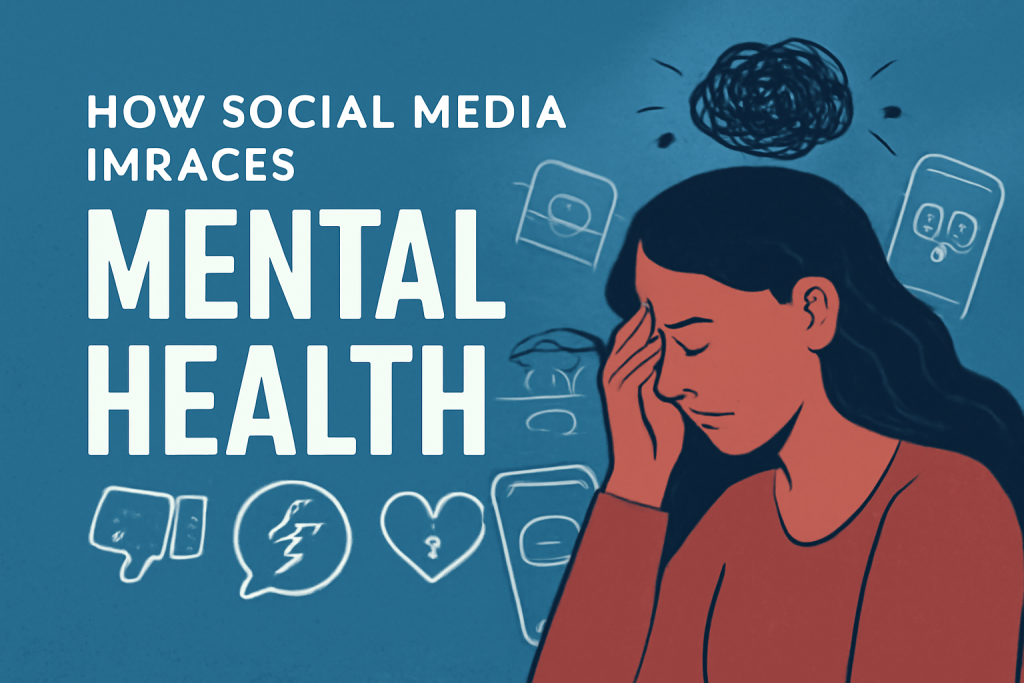
Social media has become an integral part of daily life for millions worldwide, shaping communication, entertainment, and even professional interactions. However, its impact on mental health is a topic of growing concern. While social media can offer benefits, such as connecting people, sharing knowledge, and fostering support, it also has several detrimental effects that can harm mental well-being.
1. Increased Anxiety and Depression
Numerous studies have found a link between heavy social media use and symptoms of anxiety and depression. The constant stream of posts, notifications, and comparison to others’ seemingly perfect lives can contribute to feelings of inadequacy. For example, seeing curated content of others’ accomplishments, vacations, or physical appearance can lead to social comparison, which often leaves individuals feeling inferior, anxious, or depressed.
Key Factors:
- Social Comparison: People tend to compare themselves to others, which can lead to feelings of low self-esteem.
- Fear of Missing Out (FOMO): Seeing others participate in exciting activities can trigger feelings of exclusion or loneliness.
2. Sleep Disruptions
Late-night scrolling on social media is a common habit, especially among younger users. Exposure to blue light from screens disrupts the production of melatonin, a hormone that helps regulate sleep patterns. The mental stimulation from engaging with posts, videos, and messages can also keep the brain active, making it difficult for users to fall asleep. Poor sleep patterns can further exacerbate mental health issues like anxiety, depression, and stress.
Key Factors:
- Blue Light Exposure: Impairs the natural sleep-wake cycle.
- Mental Stimulation: Constant information flow keeps the brain alert and engaged, interfering with rest.
3. Cyberbullying and Online Harassment
Unfortunately, the anonymity provided by social media platforms can also make it easier for people to engage in cyberbullying. Negative comments, harassment, and trolling can cause significant emotional harm. Victims may experience feelings of shame, isolation, and anxiety, and in extreme cases, bullying can lead to self-harm or suicidal thoughts.
Key Factors:
- Anonymity: Encourages some individuals to engage in harmful behavior without immediate consequences.
- Emotional Impact: Harassment can lead to long-lasting psychological trauma.
4. Addiction and Reduced Productivity
Excessive social media use can lead to addiction, where users feel compelled to check their phones constantly, often leading to a decline in productivity. This addiction can result in feelings of guilt or frustration, especially when tasks go unfinished or relationships suffer. The constant checking of notifications or posts can also create a cycle of emotional highs and lows, which negatively impacts mental health.
Key Factors:
- Dopamine: Social media interactions often trigger dopamine release, creating a “reward” system that encourages compulsive use.
- Loss of Focus: The constant distractions lead to procrastination and unfinished work.
5. Impact on Body Image
Social media has been linked to distorted perceptions of body image, especially among young people. Platforms like Instagram and TikTok often promote an idealized, edited, or unrealistic image of beauty. Users, particularly teenagers, can develop body dysmorphia or suffer from eating disorders as a result of trying to emulate these idealized standards.
Key Factors:
- Filtered Content: Edited images can create unrealistic beauty standards.
- Pressure to Conform: The desire to “fit in” can lead to body dissatisfaction.
6. Social Media as a Tool for Support and Advocacy
Despite its negative effects, social media also has positive aspects. Online platforms offer communities where individuals with similar struggles can find support, share experiences, and access resources for mental health. For example, mental health awareness campaigns and support groups on platforms like Twitter and Reddit provide valuable information and emotional support for those in need.
Key Factors:
- Peer Support: Social media allows individuals to connect with others facing similar issues.
- Mental Health Resources: Many platforms share informative content related to mental well-being.
7. The Role of Digital Detox
Given the potential negative impact of social media on mental health, many experts recommend taking regular breaks from online platforms. A digital detox, where users disconnect from social media for a period, can help restore mental balance. Reducing screen time can lead to improved sleep, better focus, and reduced anxiety.
Key Factors:
- Mental Clarity: Taking breaks can reduce information overload and stress.
- Healthier Habits: Encourages offline activities like exercise or spending time with loved ones.
Conclusion
The relationship between social media and mental health is complex. While it offers opportunities for connection and support, it also comes with risks that can negatively affect well-being. Recognizing the signs of social media’s impact on mental health and taking steps to mitigate its effects, such as setting boundaries, practicing self-care, and seeking professional help, is essential for maintaining a healthy balance in the digital age.
By being mindful of how we use social media and ensuring it enhances rather than detracts from our mental health, we can navigate this digital world more consciously and healthily.
Find Trusted Cardiac Hospitals
Compare heart hospitals by city and services — all in one place.
Explore Hospitals
Social media affects mental health mainly through what it repeatedly trains your brain to do: compare, react, and stay “on” all the time, which can increase anxiety, low mood, attention problems, and poor sleep—especially when usage becomes passive scrolling rather than intentional connection. Curated highlights can distort reality and push self-doubt, while constant notifications and breaking updates keep stress hormones high and reduce your ability to focus deeply or rest mentally. At the same time, social media can support mental well-being when you use it with boundaries—following helpful communities, learning skills, staying connected, and avoiding accounts that trigger negativity or body-image pressure. Simple steps like turning off non-essential notifications, limiting bedtime use, taking short weekly detox breaks, and replacing scrolling with offline recovery (walks, hobbies, real conversations) can quickly improve mood and sleep quality. The healthiest approach is balanced and mindful: use social media as a tool, not a default escape, and check in regularly with how it makes you feel after you log off.